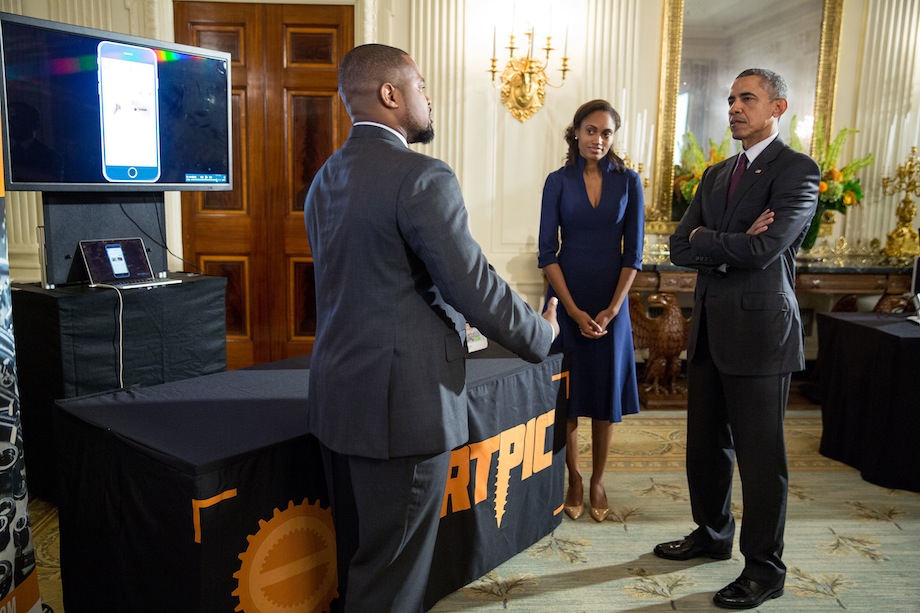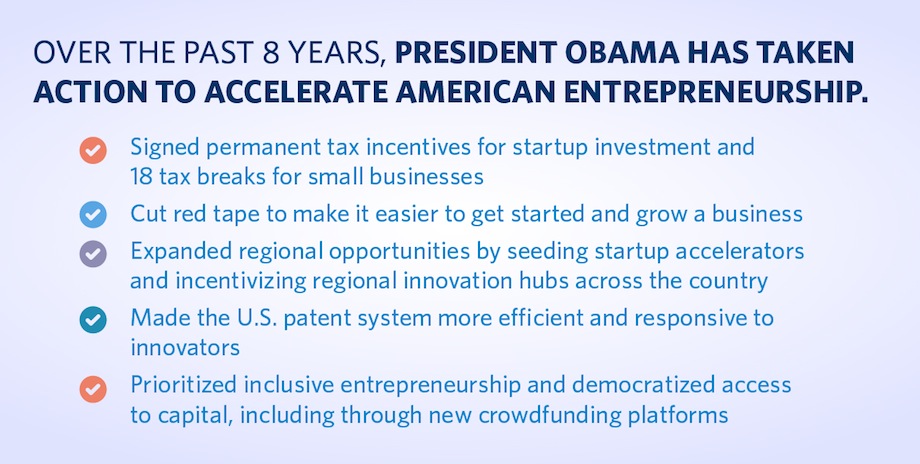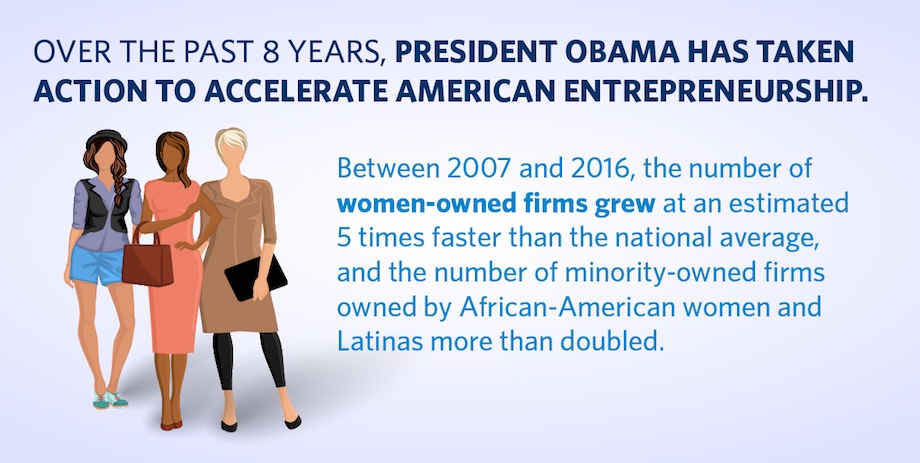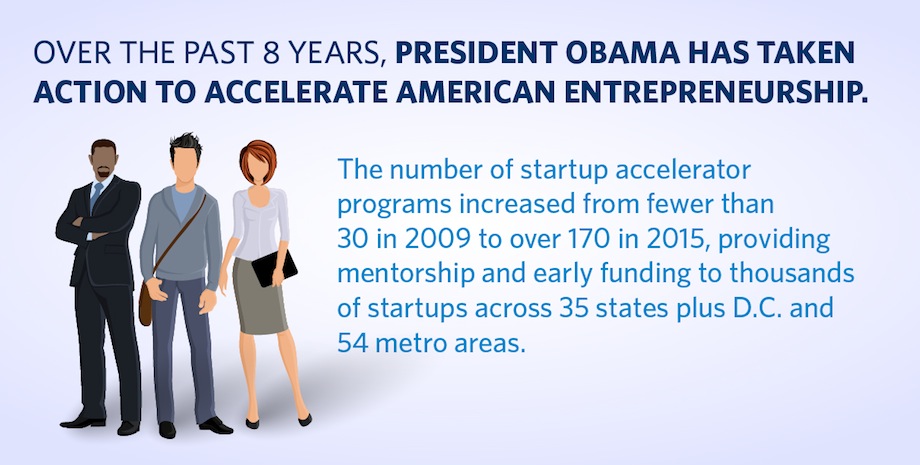

America’s entrepreneurial economy is the envy of the world. Young companies account for almost 30 percent of new jobs, and as we’ve fought back from the worst economic crisis of our lifetimes, startups have helped our private sector create 15.5 million jobs since early 2010—the longest streak of private-sector job creation on record.
Today, in celebration of National Entrepreneurship Month, the Administration is releasing a Top 10 list of President Obama’s most significant specific actions to promote American entrepreneurship, as well as announcing new efforts to build on these successes.
Over the past eight years, thanks to the grit, determination, and creativity of entrepreneurs all across the country, American startup activity is rebounding and growing more inclusive.



Here is a short summary of the President’s top 10 actions to accelerate American entrepreneurship; for more details, see here.
- Signed permanent tax incentives for startup investment, by making the research and experimentation (R&E) tax credit available to pre-revenue startups and permanently eliminating capital gains tax on certain small business investments.
- Accelerated the transition of research discoveries from lab to market, by scaling up the I-Corps entrepreneurship training program for Federally-funded scientists and engineers, opening up data on Federal research facilities and intellectual property, extending and strengthening the $2.5 billion Small Business Innovation Research (SBIR) program, and more.
- Cut red tape for entrepreneurs, with over 100 cities and communities taking the Startup in a Day pledge to streamline their business startup processes, allowing entrepreneurs to navigate requirements in as little as 24 hours.
- Expanded regional entrepreneurship opportunities, startup accelerator programs investing in regional innovation clusters, and incentivizing regional innovation strategies research commercialization centers and early-stage seed capital funds.
- Directly boosted entrepreneurs’ access to capital, with $8.4 billion in loans and venture investments catalyzed by the State Small Business Credit Initiative (SSBCI) and new pathways for impact investment funds and early-stage innovation funds through the Small Business Investment Company (SBIC) program.
- Prioritized inclusive entrepreneurship, with the first-ever White House Demo Day catalyzing major investors, technology companies, and other organizations to committing to new actions to ensure diverse recruitment and hiring, complemented by Federal agency actions to reduce barriers faced by women entrepreneurs, train veteran entrepreneurs for 21st century opportunities, and more.
- Created opportunities for promising entrepreneurs and innovators from abroad, allowing international students with qualifying science and engineering degrees from U.S. universities to extend the time they participate in practical training, and unlocking the talents of high-skilled Americans-in-waiting.
- Updated securities laws for high-growth companies, with the bipartisan Jumpstart Our Business Startups (JOBS) Act making it easier for smaller firms to responsibly make an initial public offering (IPO), allowing entrepreneurs to raise up to $50 million through regulated “mini public offerings,” and creating a national marketplace for securities-based crowdfunding.
- Made the U.S. patent system more efficient and responsive to innovators, by signing the bipartisan America Invents Act to significantly reduce patent application costs and wait times for startups and small businesses, taking steps to increase transparency and level the playing field for innovators, and more.
- Unleashed entrepreneurship in the industries of the future, including clean energy, biotechnology, the commercial space industry, nanotechnology, drones, robotics, advanced manufacturing, and more.
To ensure that every American entrepreneur has a straight shot at success, we need all hands on deck. That’s why, since the launch of the White House Startup America initiative in 2011, the President has issued a consistent public call to action to companies, nonprofits, universities, investors, and others to celebrate and accelerate high-growth entrepreneurship throughout the country.
Today, even more organizations are responding to that call to action, with engineering deans from more than 200 universities committed to building a more diverse student talent pipeline; 79 companies committed to the Tech Inclusion Pledge, an effort to make the technology workforce at each of their companies representative of the American people as soon as possible; and over 30 angel investor groups with over $800 million under management making a new commitment to promote inclusive entrepreneurship. For more details, click here.
Many of President Obama’s signature achievements have significantly increased opportunities for entrepreneurs to take smart risks and build the next generation of great American companies: the Affordable Care Act is making it easier for entrepreneurs to buy health insurance, unlocking them from traditional employer-based coverage; the Pay As You Earn program is making it easier for entrepreneurs to pay off student loan debt; the Open Data Initiative has unlocked over 200,000 government datasets as raw material for entrepreneurial innovation; ConnectED and ConnectALL are allowing aspiring entrepreneurs everywhere to access high-speed broadband, while a strong net neutrality policy ensures a free and open internet; and the President signed into law the largest annual increase in research and development funding in America’s history.
These and other efforts to address income inequality, promote competitive markets, reduce unduly restrictive occupational licensing, and scale up rapid training for 21st century technology skills are essential to ensure that America remains the best place on the planet to start and scale the next great company.



